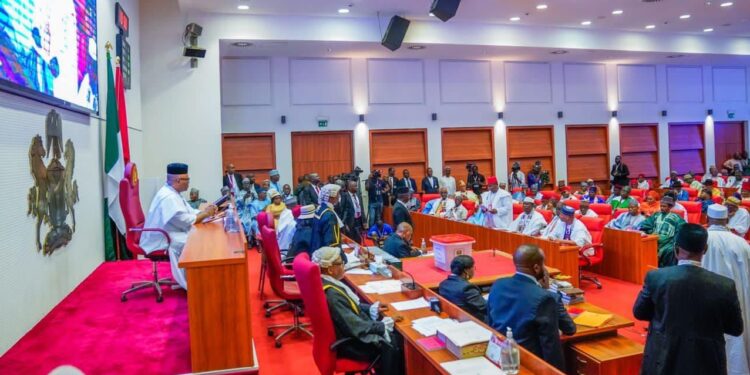By John Ikani
In a move stirring controversy, Nigeria’s Senate on Tuesday passed a bill proposing a return to the nation’s pre-independence anthem, “Nigeria, We Hail Thee.”
The current anthem, “Arise O Compatriots,” adopted in 1978, would be replaced if the bill receives presidential assent.
The “National Anthem Bill, 2024” sailed through its third and final reading in the upper house.
This followed consideration of a report compiled by the Senate Committees on Judiciary, Human Rights & Legal Matters, and Federal Character & Intergovernmental Affairs.
However, the bill’s passage wasn’t without dissent. Lateef Fagbemi, the Attorney-General of the Federation, voiced concerns about the swiftness of the process and advocated for broader public consultation.
Despite these objections, the bill enjoyed a rapid journey through both houses of parliament.
The bill now awaits President Bola Tinubu’s signature to become law.
If enacted, this would mark the first time Nigeria’s national anthem receives legal backing.
Senator Mongonu Tahir, representing Borno North, presented the committee’s report during the plenary session.
He emphasized the bill’s purpose: to establish a legal framework for the national anthem, granting it “all the legal powers embedded in it.”
Tahir addressed the Attorney-General’s concerns, arguing that the bill doesn’t require extensive citizen participation through public hearings or resolutions from various government bodies.
He maintained that, unlike a constitutional amendment, this bill qualifies as an ordinary bill, requiring only three readings and a public hearing.
Advocating for the bill’s passage, Tahir asserted that “Nigeria, We Hail Thee” better reflects the nation’s people, culture, values, and aspirations.
He argued that the change would foster national unity, ignite patriotic zeal, and celebrate Nigeria’s heritage. The committee ultimately recommended the bill’s approval.
Following committee deliberations, Senate President Godswill Akpabio presented the bill for a voice vote, which the Senate overwhelmingly supported.
Notably, Akpabio commented that the Attorney-General, lacking legislative power, didn’t fully grasp the bill’s passage process. With the final reading complete, the Senate passed the bill.
The future of Nigeria’s national anthem now rests with President Tinubu’s decision. If signed, the country will soon resonate with the tunes of “Nigeria, We Hail Thee” once again.




































